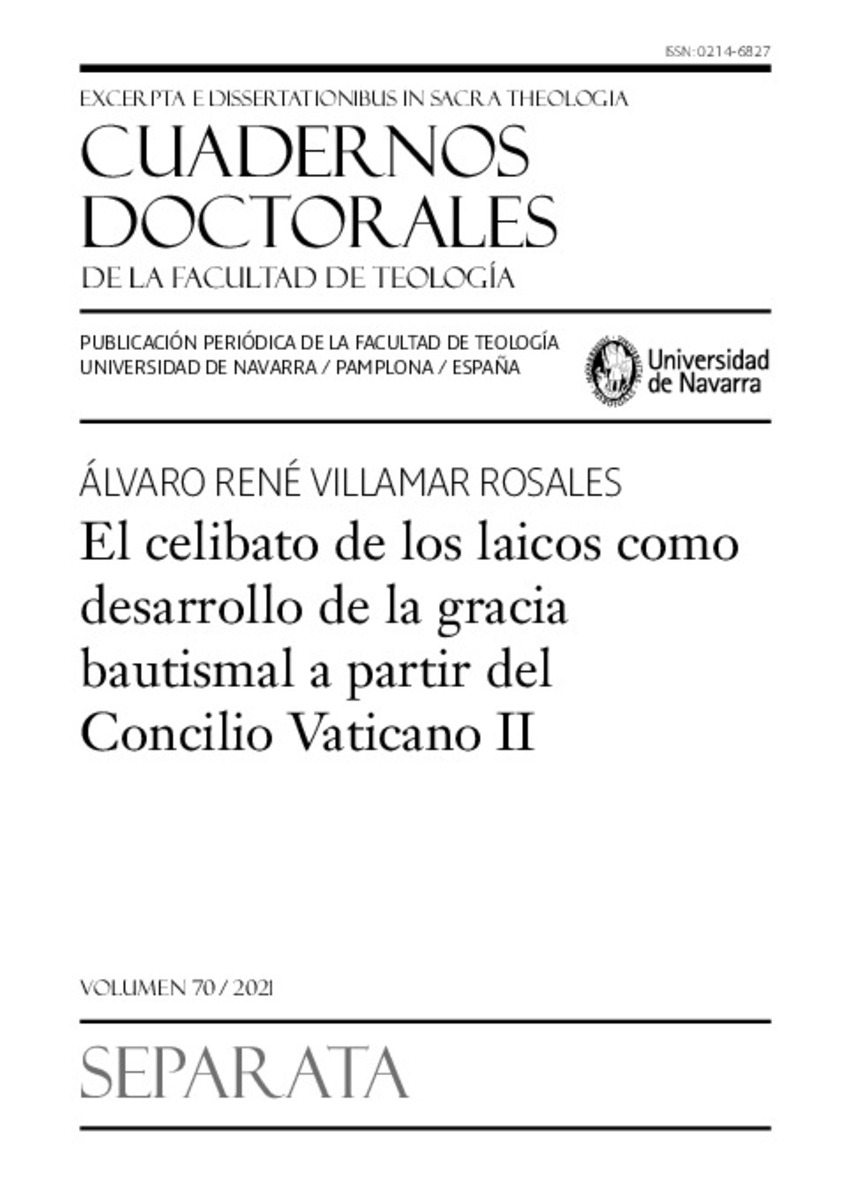Full metadata record
| DC Field | Value | Language |
|---|---|---|
| dc.creator | Villamar-Rosales, A.R. (Álvaro René) | - |
| dc.date.accessioned | 2021-06-21T10:58:25Z | - |
| dc.date.available | 2021-06-21T10:58:25Z | - |
| dc.date.issued | 2021 | - |
| dc.identifier.citation | Villamar-Rosales, A.R. (Álvaro René). "El celibato de los laicos como desarrollo de la gracia bautismal a partir del Concilio Vaticano II". Cuadernos Doctorales de la Facultad de Teología. Excerpta e Dissertiationibus in Sacra Theologia. 70, 2021, 157 - 225 | es |
| dc.identifier.issn | 0214-6827 | - |
| dc.identifier.uri | https://hdl.handle.net/10171/60724 | - |
| dc.description.abstract | La llamada universal a la santidad tiene su origen en el evangelio. Es el mismo Cristo quien anima a buscarla: «sed vosotros perfectos como vuestro Padre celestial es perfecto» (S. Mateo 5, 48). Todo bautizado: casado, célibe, viudo, sacerdote, religioso, etc., debe luchar por alcanzar este ideal según las condiciones, personas, circunstancias, etc., de las que se encuentra rodeado. La llamada a la santidad es la misma para todos, sin privilegios, grados o diferencias. Es distinto el camino a través del cual cada uno de ellos debe conseguirla. El celibato es uno de los caminos a recorrer para buscar la santidad. Puede ser vivido por: sacerdotes, religiosos y laicos. Cada uno de ellos, juntamente con los demás fieles, tienen como objetivo la identificación con Cristo. Ser santos a través de ese camino. Fundamento de todo celibato es el de Cristo. De Él proviene su fuerza y ejemplo. Conocer las razones del mismo y sus características permite llevarlas al terreno del celibato vivido por los fieles bautizados: sacerdotes, religiosos o laicos. Ejemplo de celibato vivido por fieles laicos lo podemos descubrir desde los primeros tiempos de la Iglesia. En el siglo XXI encontramos instituciones laicales cuyos miembros viven esta característica dentro de la vocación a la santidad a la que se encuentran llamados. Se hace necesario continuar el estudio y la profundización en el mismo con el objetivo de poder explicar su belleza y atractivo. | es_ES |
| dc.description.abstract | The universal call to holiness has its origins in the gospel. The call comes from Christ himself: «you, therefore, must be perfect, as your heavenly Father is perfect» (Matthew 5, 48). All christians, regardless of their condition, whether married, celibate, widowed, religious, should strive for holiness in their current circumstances. This invitation is open to all without privileges or differences. However, every person has his or her own path to follow. One of the paths to holiness is the celibate life. It may be lived by the priest, the religious and the lay person. The goal is the same in each case (as in that of any faithful): identification with Christ. All celibate life has its foundation in Christ, deriving from him its strength and example. Knowing and understanding Christ’s celibacy –its purpose and its characteristics– permits a deeper understanding of the celibacy lived by priests, religious or lay people. From the times of the early christians, we find examples of lay persons leading a celibate life. In the 21st century we find lay institutions whose members live this feature (celibate life) in their quest for holiness. Theological reflection on celibate life is needed in order to highlight its beauty and attractiveness. | es_ES |
| dc.format.extent | 540 | es_ES |
| dc.language.iso | spa | es_ES |
| dc.publisher | Servicio de Publicaciones de la Universidad de Navarra | es_ES |
| dc.rights | info:eu-repo/semantics/openAccess | es_ES |
| dc.subject | Celibato | es_ES |
| dc.subject | Laicos | es_ES |
| dc.subject | Santidad | es_ES |
| dc.subject | Celibacy | es_ES |
| dc.subject | Laity | es_ES |
| dc.subject | Holiness | es_ES |
| dc.title | El celibato de los laicos como desarrollo de la gracia bautismal a partir del Concilio Vaticano II | es_ES |
| dc.type | info:eu-repo/semantics/article | es_ES |
| dc.publisher.place | Pamplona | es_ES |
| dadun.citation.endingPage | 225 | es_ES |
| dadun.citation.publicationName | Cuadernos Doctorales de la Facultad de Teología. Excerpta e Dissertiationibus in Sacra Theologia | es_ES |
| dadun.citation.startingPage | 157 | es_ES |
| dadun.citation.volume | 70 | es_ES |
Files in This Item:
Statistics and impact
Items in Dadun are protected by copyright, with all rights reserved, unless otherwise indicated.






